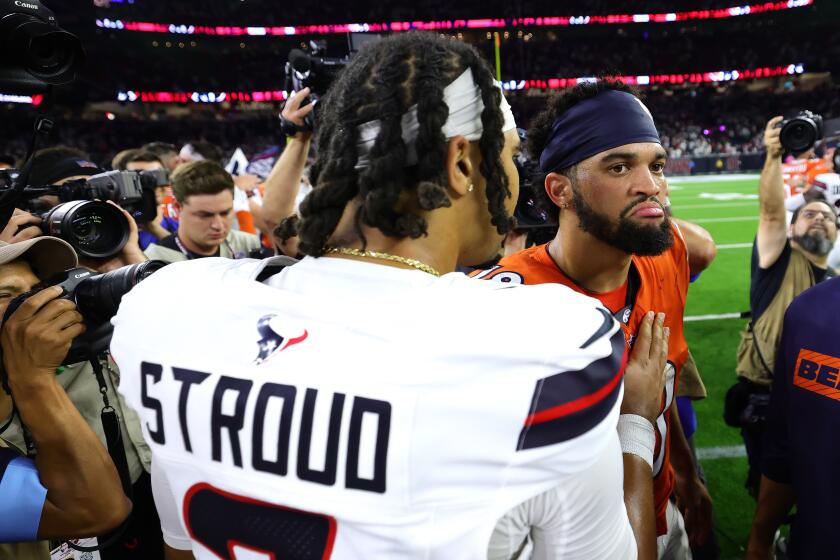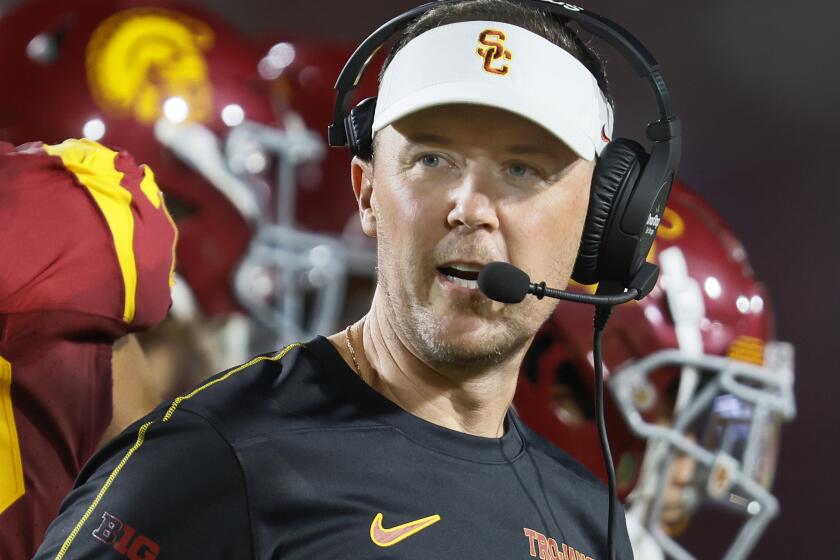Coaches monitor Mayo case
When allegations surfaced this year that USC basketball star O.J. Mayo had received improper benefits from a sports agency funneled through close advisors, the university pointed to its own scrutiny of Mayo and said an NCAA “investigation” had deemed him eligible.
Now, with two sources confirming that an NCAA representative met with Mayo and advisor Rodney Guillory for several hours before certifying the player’s eligibility for the 2007-08 school year, there is national focus on how that NCAA pre-screening process could affect USC’s possible culpability in the Mayo scandal.
USC Athletic Director Mike Garrett and men’s basketball Coach Tim Floyd declined to comment, but university officials have privately expressed frustrations about the severity of any looming discipline the NCAA or Pacific 10 Conference may deliver the Trojans in light of the NCAA screening of Mayo.
And several college basketball coaches say they are closely watching to see how the case turns out.
“We’re all interested in seeing what happens to USC,” said Kansas State Coach Frank Martin, “not to see them meet their fate, but to see if there are issues that happened that have nothing to do with USC’s knowledge.”
Added Martin, who last year fielded a team with high-profile freshman players Michael Beasley (selected No. 2 in this year’s NBA draft) and Bill Walker (second-round pick of Washington Wizards): “As institutions, we can’t control anything these athletes do before they step on our campus.”
In Mayo’s case, the allegations cover the period before and after he arrived at USC, where he broke the freshman scoring record in leading the team to the NCAA tournament.
Former Guillory associate Louis Johnson told ESPN’s “Outside the Lines” that Bill Duffy and Associates gave Guillory $250,000, and Mayo was given $30,000 in gifts, clothing and hotel accommodations during his time in high school as well as his freshman year at USC -- or after the NCAA screened him.
Mayo, the third pick in the NBA draft, has denied any wrongdoing. Guillory, an events promoter from Inglewood, has not returned numerous messages left by The Times.
Some coaches argue that by stamping a figurative seal of approval on a top recruit, the NCAA effectively reduces a college’s accountability if the athlete is later found to have received extra benefits before enrolling in school.
Memphis Coach John Calipari said he has “empathy” for USC, “if it happened around them.”
When he coached at Massachusetts, Calipari’s Minutemen had their Final Four appearance and 4-1 NCAA tournament record in 1996 vacated after it was found center Marcus Camby (now a Clipper) had accepted benefits, including $1,800 for clothing at a Hartford, Conn., store.
“I even got a letter from the NCAA saying I was an innocent victim of this -- this was nothing I could ever have known about, $1,800 in Hartford,” Calipari said.
Mayo, as one of the top 40 U.S. recruits, was subjected to the interview in the NCAA’s top-prospect program. Like all athletes, he also had to take an online survey in the year-old amateurism certification program. He would have had to deny receiving improper benefits then to be cleared to play.
Asked to describe the program, NCAA spokeswoman Stacey Osburn said in an e-mail to The Times: “I’m not sure ‘scrutiny’ is an accurate depiction of the elite-athlete program. The purpose . . . is to gain a better understanding of the amateur status of elite athletes in select sports and to help educate these elite athletes on the NCAA amateurism rules. . . . “
UCLA Coach Ben Howland said the NCAA screening is “good, they’re trying to do the best job they can do.” Howland said the NCAA interviewed former star Bruins Kevin Love and Jordan Farmar in recent years. “When people see the money these guys will be making as projected first-rounders . . . it’s hard for us,” he said. “You don’t have a lockdown on kids.”
But as one former NCAA enforcement agent cautioned, “If athletes want to cheat, if they’re trying to violate rules, they’re not going to give you an admission of wrongdoing.”
Beyond that, eligibility rules in NCAA bylaws place a “higher standard on the institution,” to explore day-to-day concerns about a player that may emerge, such as the athlete’s driving a new car, or -- like Mayo -- having an expensive television in his room and accepting free tickets to a Lakers game at Staples Center.
The NCAA will ask a university what questions it asked when new information came forward, the former agent said.
“You can’t just say, ‘The NCAA already checked him and moved on.’ You’re seeing the kid every day, you haven’t moved on,” said the former agent, who spoke on the condition of anonymity because the investigation is continuing.
An area of concern might be Guillory’s prior connections to former USC player Jeff Trepagnier and ex-Fresno State star Tito Maddox, who were disciplined for accepting benefits from aspiring Las Vegas agents. It is not known if the NCAA asked Guillory about those ties.
The NCAA could penalize USC for a lack of institutional control in the Mayo case.
Richard A. Johanningmeier, NCAA associate director of enforcement, participated in the pre-enrollment screening of Mayo and current investigation, said a USC source who was forbidden from speaking on the record about the Mayo case.
“We handle it on a case-by-case basis,” Osburn said. “So, our threshold for institutions is: Did they know or should they have known? Do they have the processes in place to catch violations?”
Michael Glazier, a former member of the NCAA enforcement staff who heads a Kansas law firm’s collegiate sports practice group, said the NCAA review of an athlete “doesn’t alleviate an institution’s responsibility to analyze the background of the recruit . . . and to examine any warning signs that may emerge in a diligent, comprehensive manner.”
He said that if USC met that responsibility, he thought the NCAA would not impose severe penalties, such as a postseason tournament ban or scholarship limitations. But Glazier added that he thought lesser penalties such as stripping USC of victories and forcing it to return money from the NCAA tournament were “close to automatic.”
--
Go beyond the scoreboard
Get the latest on L.A.'s teams in the daily Sports Report newsletter.
You may occasionally receive promotional content from the Los Angeles Times.




